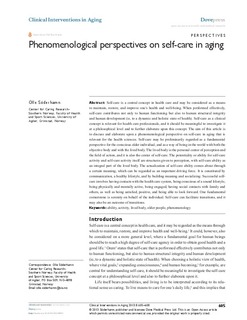| dc.description.abstract | Self-care is a central concept in health care and may be considered as a means to maintain, restore, and improve one's health and well-being. When performed effectively, self-care contributes not only to human functioning but also to human structural integrity and human development (ie, to a dynamic and holistic state of health). Self-care as a clinical concept is relevant for health care professionals, and it should be meaningful to investigate it at a philosophical level and to further elaborate upon this concept. The aim of this article is to discuss and elaborate upon a phenomenological perspective on self-care in aging that is relevant for the health sciences. Self-care may be preliminarily regarded as a fundamental perspective for the conscious older individual, and as a way of being in the world with both the objective body and with the lived body. The lived body is the personal center of perception and the field of action, and it is also the center of self-care. The potentiality or ability for self-care activity and self-care activity itself are structures given to perception, with self-care ability as an integral part of the lived body. The actualization of self-care ability comes about through a certain meaning, which can be regarded as an important driving force. It is constituted by communication, a healthy lifestyle, and by building meaning and socializing. Successful self-care involves having contacts with the health care system, being conscious of a sound lifestyle, being physically and mentally active, being engaged, having social contacts with family and others, as well as being satisfied, positive, and being able to look forward. One fundamental cornerstone is serenity on behalf of the individual. Self-care can facilitate transitions, and it may also be an outcome of transitions. | no_NO |
